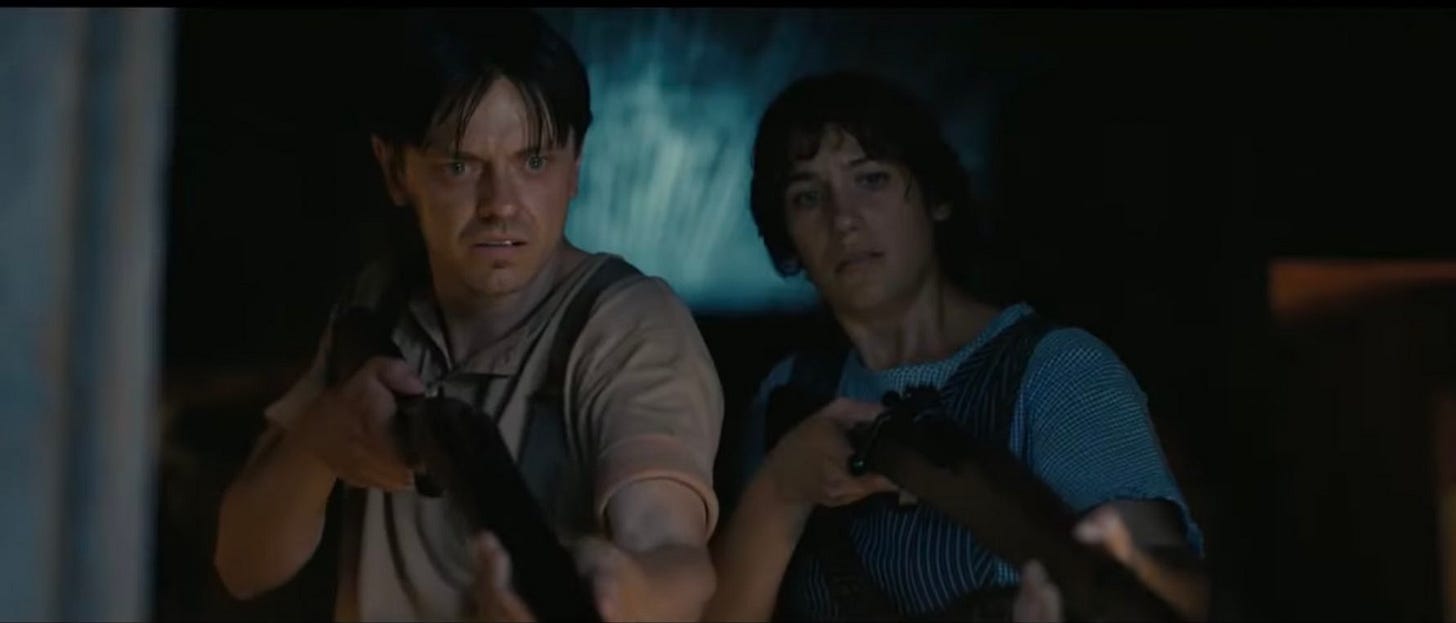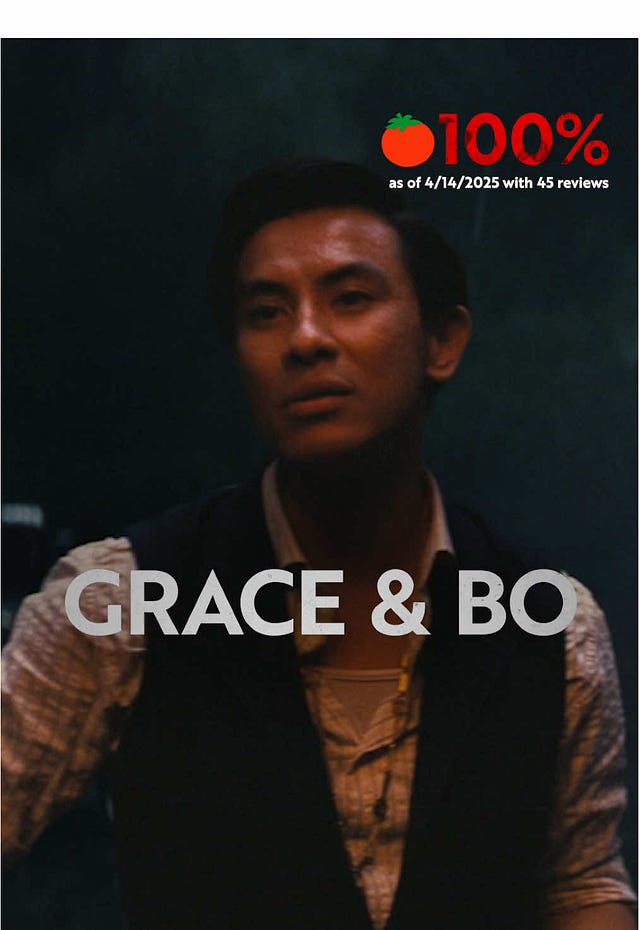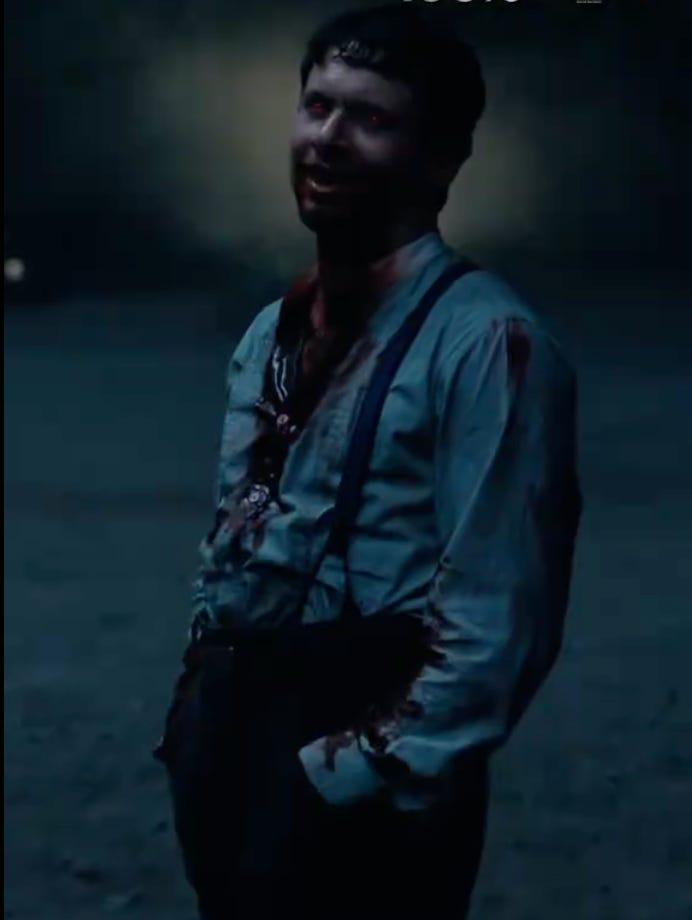I have already written plenty about Sinners, the first movie of 2025 to crack me open like a little egg. (Materialists, your time is coming.) I had to write about how it fits into our current cinematic twinning trend. I had to write about how Smoke and Stack’s costume design contains their entire personalities, backstories, and arcs. And now I have to write about the inimitable Grace Chow. Because some of the worst takes I’ve seen about Sinners—and I’ve seen some pretty fucking awful ones—are the ones directing an unfair amount of vitriol directed towards this tragic character.
Spoilers for Sinners ensue, but you already knew.
The Chows are Smoke’s friends1 who own two storefronts downtown. They’re the first stop Smoke makes when he splits from Stack and Sammie to set up for the juke joint’s grand opening. (Stack’s job—get the entertainment and the bouncer. Smoke’s job—get the food, supplies, and sign.) Bo, Grace, and their daughter Lisa are the only Asian-American characters we see in the movie, serving as some important historically accurate representation. Bo and Grace are also serving as some important eye candy, but I digress.
About 90 seconds after meeting Grace, Bo, and Lil’ Lisa, I whispered to my friend, “I fear I’m in love with this family, and I’m gonna get my heart broken.” And yeah, once the vampires descend on the juke and Mary has torn through Stack’s neck and fled into the night, everyone still inside wisely listens to Annie and closes ranks, doing a quick The Thing/The Faculty-coded test to make sure everyone is who they say they are. And here’s where things go off the rails, for our dear characters and for the takes.
The controversy with Grace is two-fold: First, that as soon as she realizes some supernatural shit is afoot, Grace sends Bo to get their car and get them the hell out. “We came to help with the party, not this,” she urges him. Second, that once Bo is turned2 and Remmick gloats, sexually taunts Grace in Chinese, and threatens Lisa, Grace insists on letting the vampires in so the gang can kill them all.
Now, Grace’s first reaction when evil and dangerous shit starts going down is what everyone says they would do in a horror movie situation. She very wisely wants to nope on outta there. Is she being selfish? Absolutely. The safe thing to do in a horror movie is often the selfish thing. Going back into a dangerous place to save someone very rarely works out in these situations, and audience members who like to think of themselves as savvy should respect the savvy move when they see it.
Plus, as I’ve said before, vampires prey on our emotional vulnerabilities. Mary’s desire to belong, and to be helpful to Stack rather than burdensome, is what gets her got. Stack’s love and desire for Mary is what gets him got. The white couple that Remmick turns—their open racism gets them got.

Grace is vulnerable, too; not only does this white vampire start speaking to her in Chinese, and about knowing how she likes to get licked3, but he openly threatens her daughter. The only other person inside that juke who has loving family connections outside is Sammie,4 and his people have to hold him back from going to the vampires multiple times. It’s not Grace’s fault that she knows Smoke’s only weakness (getting bitten on the hand by a human woman, apparently) and can get free of him.
She is also the only one in that juke not in denial about the effectiveness of the “hole up ‘til sunrise” plan. Those vampires are patient, but only to a point. They’re not going to stand outside waiting for these six people until they burn in the sunrise, and they’re not going to stop with these six people. Our protagonists need to step up and be heroes. “Ain’t you a soldier? Didn’t you just shoot two men for touching your truck?…If now ain’t go time, then I don’t know what is.” Like, Smoke pulled a gun on his cousin 15 minutes ago for saying he wants to sing the blues in juke joints. Let him put his trigger finger to good effect for once.
Also, frankly, it made sense dramaturgically. This is a Southern Gothic horror story, meaning you’re walking in knowing that these characters are, generally, doomed. And if the genre didn’t tip you off, the cold open of Sammie be-dragging his bedraggled body across the threshold of his daddy’s church makes the doomed ending basically inexorable.5 At the end of the day, the day’s gotta end, and someone’s gotta invite the vampires in.
Many of the bad takes I’ve seen about Grace’s actions have leaned into some ugly anti-Asian bigotry. Namely, that the movie is telling us the truth about how non-Black solidarity crumbles when shit gets real, and that Grace was never in true community with the rest of our heroes, because their relationship was strictly transactional. Personally, I hate to invoke authorial intent, because I’m a bit of a deconstructionist myself. But in this case, I’ll make an exception, because Ryan Coogler agrees with me.
“For me, in this movie, man, their relationship was love, bro…that was why they were there. They didn't just paint a sign—no, they stuck around, and helped, and built, and danced with them, you know? But the issue within the film was, when it jumped off, Remmick knew how to attack that character. And what happened with that character was not because that character is Asian, but because that character is a mom.”
Grace and Bo are absolutely part of this community. We see this in the way both of them respond when Smoke shoots two people outside their storefront, and then asks them to help out with the juke. Bo agrees to fix up Smoke’s two victims and supply the juke with zero consternation. Grace speaks Smoke’s preferred language—numbers to numbers—with alacrity. And again, we see how few people Smoke trusts in the first place.
There’s also the clue in Grace’s very name. Grace Lee Boggs, the Chinese-American socialist Civil Rights activist, was an active and critical part of the Asian American, Black Power, and labor rights movements. Her life’s work was very explicitly about how our hopes for liberation—as Black people, as Asian-American people, as workers—were braided together. Her solidarity was strong enough that “in some of her FBI files, Boggs…was described as "probably Afro Chinese."”6
And there Grace and Bo are, working and dancing and loving alongside everyone else. In that transcendent centerpiece scene, Sammie conjures their ancestors, just the same as he conjures his own.
Grace’s behavior isn’t meant to show a lack of solidarity in the face of danger. Grace’s behavior is that of a grieving widow and, more crucially, a mother who is willing to die to protect her child.
Not for nothing, but when she does die, mama goes out like an actual saint. After she hurls that Molotov cocktail, she launches herself right at her (and my!) beloved; and not only does she stake him, but she allows them both to be consumed by flame to make sure she finished the job. That level of commitment is as breathtaking as it is heartbreaking. We don’t see much of Lisa, but I keep hoping that she knows what a badass mom she has.
So, for all these reasons—her toughness, her wisdom, her commitment—not too much on my girl.
A rare category of people.
Baby 😭
!!!!!!!
I have not seen two women give less of a damn about their husbands than Pearline and Mary, and you know what, good for them.
In truth, I’m very tired of cold opens like this. For me, the sense of dread it leaves over the film (1) is redundant, due to the genre; and (2) comes at the cost of the tragedy hitting the way it could. Let me keep hoping things may still work out, until they don’t! Let me feel it the way the characters do!
Chow, Kat. “Grace Lee Boggs, Activist And American Revolutionary, Turns 100.” NPR. June 27, 2015.






The fact that viewers took an “us vs them” approach to interpreting this film when Coogler went out of his way to show the diversity of the region is kind of maddening. The application of 2025 political lens to a period film is nuts. What’re these people gonna do when they do some reading and see the coalition that fought for Civil Rights?
Wonderful piece! Hating on Grace does seem to ignore the horror story that Coogler *chose* to tell. This was not a Texas Chainsaw Massacre or Alien type of set up, where bonds are loose and a matter of convenience or mere survival. All of the characters had a history together, would have lived and died for each other. Smoke refusing to get his brother’s body out of the barn was also a stupid decision by horror movie logic - but it was his brother, wtf was he actually going to do?
I have nebulous thoughts about how Coogler used Gothic/doomed romance to build out the emotional register, and how that’s an element that’s been missing from a lot of recent horror. Bo and Grace burning alive together? Grace’s charred skeleton sobbing while she staked her beloved through the heart? Coogler could make a modernized Wuthering Heights adaptation if he wanted to and it would change lives.